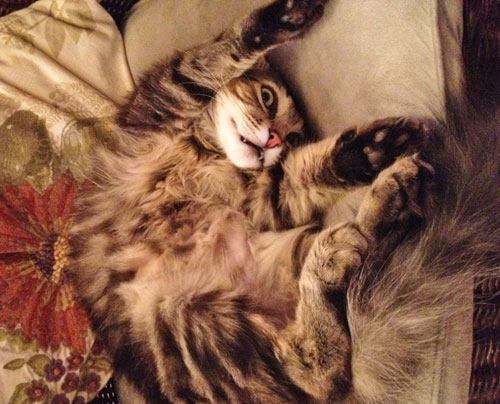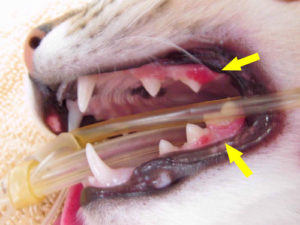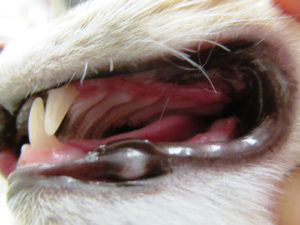
When Shaggy was only 5 months old our Seattle veterinarians noticed that he was already developing inflammation of his gums, or gingivitis. Usually pets don’t develop this until 2 years old at the earliest and it is usually associated with heavy accumulations of tartar. We tried feeding Shaggy a diet specially formulated to clean teeth and prevent gingivitis, but his gingivitis continued to worsen very quickly.
Shaggy has a condition called stomatitis. Stomatitis is extreme inflammation of all of the gingival tissue, starting at the gum line and progressing upward. We do not know why cats develop this but it is thought to be an immune-mediated illness. These cats seem to be “allergic” to plaque, tartar and even their own teeth. Stomatitis is extremely painful, although most cats continue to eat and act normally. Many owners have no idea that this is happening in their cat’s mouth.
There are a number of treatments for this disease including dental cleanings, steroid administration, laser therapy, and regular tooth brushing. Unfortunately, these usually only provide very temporary, if any, relief. Dental experts have determined that removing all or most of the teeth is the most successful way to manage this disease. While it may seem extreme, nearly all cats are much more comfortable, and their gums are healthier, after their teeth have been extracted.
You may think a cat with no teeth would have difficulty eating but, in fact, once the gum disease resolves, they feel so much better and some even continue to enjoy dry food. You can see how red Shaggy’s gums appear in the first photo and how they seem to “grow” over the teeth. Luckily we identified Shaggy’s condition early and treated with extraction of his cheek teeth. He was able to keep his canine teeth and incisors.
Shaggy recovered very quickly and you can see in the second photo how great his mouth looks once he healed from surgery and his teeth are no longer there to make his gums so angry!




Hi, our husky is 5 and has developed an allergy to his own plaque in the last couple of years. He is on steroids which are controlling the illness, however he has now developed anxiety and is constantly messing in the house. We are trying everything to help him however nothing seems to be working now. The specialist suggested taking all his teeth out however we did not think he would have a good quality of life. Can you suggest anything to help? Kind regards, Hannah
You need to rely on your own veterinarian and a dental specialist in your area to guide your decision. We can’t give out medical advice for patient’s we have not seen.
I have an older dog that has developed this disease as well and we’re starting steroids and if that doesn’t work we will we will be removing the rest of her teeth. I have two other female dogs that have had most of their teeth have been removed just due to bad teeth and overtime but as far as quality of life goes you couldn’t tell that it has affected them at all! it doesn’t slow them down eating or playing nothing. they seem healthier
Found out yesterday my cat had this; I had never heard of this condition & had no idea she had it; she seemed completely normal! Her teeth were all extracted. I was so worried (because it seemed so extreme) but when she got home & got her “sea legs” again, she went straight for the (soft) food & water. I got head-butted a lot and she slept in the bed with me just like nothing happened 🙂
So glad that your kitty had such a great outcome. It’s amazing how well they do when painful teeth and gums are addressed.
Is it very expensive to have all of a cat’s teeth removed? Do they really enjoy a good quality of life after extraction?
Cats do extremely well if their mouth is treated appropriately. Fees vary based on the specific patient. We advise consulting with a veterinary dental specialist to determine what is best for your cat.
Greetings,
I just took my cat Chutoro to a cat specialist on Mercer Island today. Due to resorption, 8 teeth need to be extracted. The vet did not seem to know much about the cause. I’d like to know if you think I should remove all of the cat’s teeth instead, as this vet said the resorption will only continue to worsen throughout her life.
Thank you!
The cause of tooth resorption in cats is not well understood, despite ongoing research. We can’t give advise about your individual cat. However if anyone ever has questions about how to proceed with dental care for their cat, or dog, you always have the option of consulting with a veterinary dental specialist to get a second opinion. Some tooth issues are quite complicated and getting the best advice will help you make decisions. Here’s a link to finding veterinary dental specialists in your area: Find A Veterinary Dental Specialist